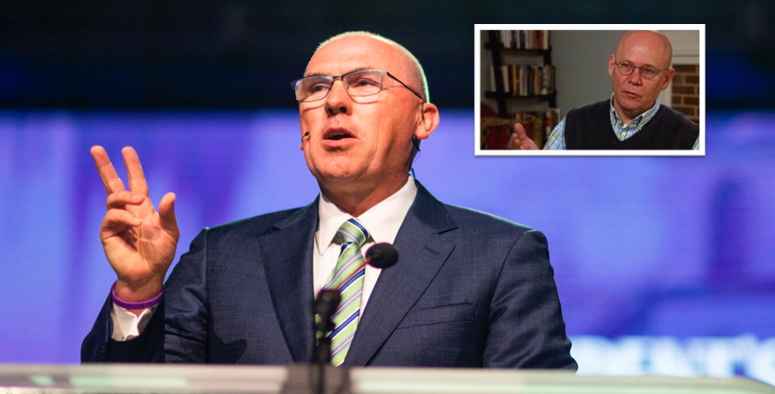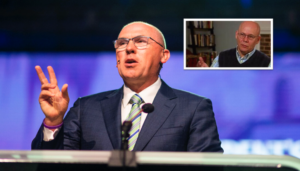EDITOR’S NOTEBOOK: What To Make of SBC President Bart Barber’s Apology

OPINION–Southern Baptist Convention (SBC) President Bart Barber made a big mistake.
Last year, he signed an amicus brief that was submitted to the Kentucky Supreme Court that argued against statute of limitations reform. The reforms that the SBC argued against were precisely the reforms that many sex abuse survivors want and have been working for in Kentucky and around the country.

The SBC should simply have kept its mouth shut. The case involved had no connection to the SBC, the Executive Committee (EC), Lifeway Christian Resources, and Southern Baptist Theological Seminary (SBTS). Nevertheless, all four entities were represented in the brief. The SBC has more than enough problems of its own without poking around in other people’s problems. That fact alone should have compelled silence by the SBC in this case.
The process by which the SBC commented was also badly flawed. First, it’s clear that the legal team took the lead on this project. That was a mistake. The key issues for the SBC in this matter of clergy sex abuse should be pastoral, not legal. It’s clear that the legal team saw this matter primarily as an exercise in risk management and the mitigation of liability, with little regard for the optics, or to how this action would impact survivors.
Speaking of optics: Barber signed off on the brief on Aug. 9, 2022. That was just one day after he announced the appointment of the SBC’s Abuse Reform Implementation Task Force. The Task Force itself was not notified and later said they felt blindsided. Even if it was a good idea for the SBC to weigh in on this issue (again, it was not), the timing couldn’t have been worse. This amicus brief undermined the Task Force and called into question the seriousness of Barber’s intentions to deal with sexual abuse in the SBC.
That’s the bad news. The good news is that Barber now seems to understand that.
In an extraordinary apology that Barber published on his personal blog, he owned the mistake and asked for forgiveness. Barber confessed that he certainly “did not give this decision to file this brief the level of consideration that it deserved.”
“Some of the most important information affecting my decision was information I failed to seek,” Barber continued. “Knowing what I know now, I know that I should have asked more questions. I should have taken the opportunity to request a meeting between the Interim CEO, myself, and our legal counsel to gather more information.”
Access to MinistryWatch content is free. However, we hope you will support our work with your prayers and financial gifts. To make a donation, click here.
Barber admitted that his actions ended up “hurting survivors.” And although his determination “to advance abuse reform in the SBC is no less than it was when” he began, he understands that his credibility with survivors “is harmed by this, perhaps irreparably.”
Barber then asked for prayer, saying, “I am counting on your prayers and I am counting on wisdom from above. I hope that I learn a little with every mistake that I make, and I hope that those of you who are angry with me today can find it in your hearts to forgive me.”
It was an extraordinary admission of error, though I must also say that – as Barber himself acknowledged – it may not be enough. His credibility may indeed have been harmed “irreparably.”
We must also acknowledge that while Barber’s statement was transparent and vulnerable in many ways, it also had a few notes of rationalization and self-justification. He should have just said, “I’m sorry. I made a mistake. I hope you can forgive me. Full stop.” Instead, he could not resist weighing in on the underlying legal question, saying, “I am not sure exactly what I think about statutes of limitation. I think they are a mixed bag.”
Thousands of abuse survivors would disagree. And even if he is right and they are wrong, this was – again — the wrong time to make that point.
Not too long ago (though before this incident), I did an in-depth interview with Bart Barber. I came away from that interview thinking he was a good man, a thoughtful man, a caring man, a man I would love to have as my pastor.
Leading the nation’s largest protestant denomination requires all that, but it also requires advanced organizational skills. I’m not sure that’s a good thing. I think there’s a case to be made that, as economist and social critic E.F. Schumacher said, “small is beautiful.” When an organization – or at least a church or religious body — gets to be so large that it requires advanced professional management skills, is it possible that this is the very definition of “too large”?
I don’t know the answer to that question. Some of the problems we face in the world are so big that they require big solutions and big resources that only big organizations can bring. But big organizations also bring big temptations, such as the temptation to put the institution before people. Big organizations must constantly be on guard against the real possibility of trampling underfoot the very people the organization professes to serve.
That’s why this episode in the life of the SBC and in Bart Barber’s presidency is so instructive: It raises questions that all of us in church and ministry leadership need to ask, and answer.



